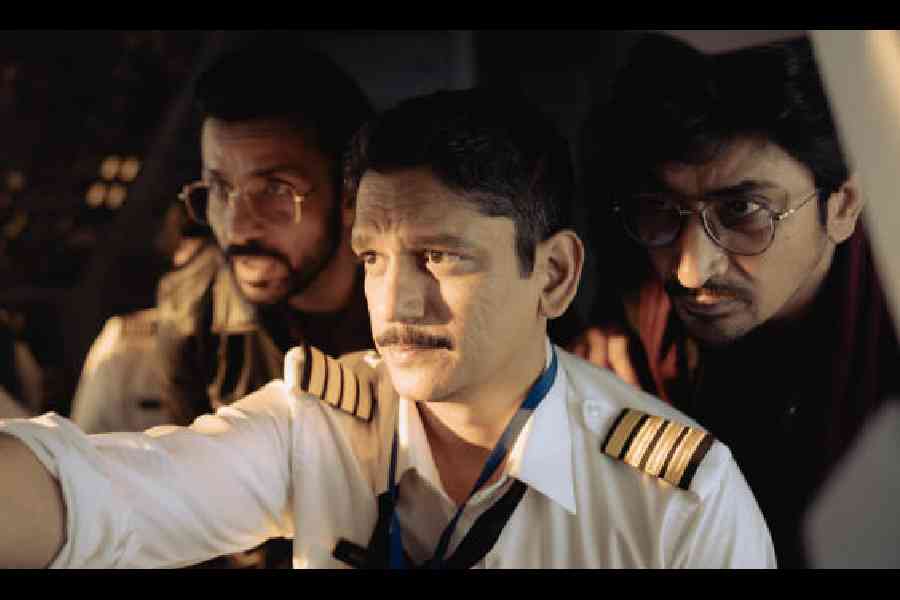A lot of what we get to see in IC 814: The Kandahar Hijack is present in the public domain. After all, it was perhaps — as those like me who are of a certain vintage will recall — Indian news television’s first minute-by-minute, blow-by-blow account of an ‘event’ that shook the nation. The year was 1999, a time when news channels did not contribute to noise pollution. The hijacking of the Indian Airlines flight on its way from Kathmandu to Delhi and its subsequent hop, skip and jump from Amritsar to Lahore to finally Kandahar was a weeklong nightmare that the nation collectively watched on their TV screens with horror and heartbreak, and, thankfully, negligible sensationalism.
The six-episode Netflix series by Anubhav Sinha is based on the book Flight Into Fear: The Captain’s Story, written by Devi Sharan and Srinjoy Chowdhury. Devi Sharan was the pilot of the hijacked flight who was subsequently hailed a hero. It is understandable that a large part of what unfolds in The Kandahar Hijack is told from the point of view of the captain (played by a stoic Vijay Varma), with much of the initial episodes being dedicated to the hijack executed after a largely predictable set-up of what is to follow.
Choosing to play it as a by-the-numbers rendition of the real-life event, Sinha’s otherwise distinctive voice is found missing in the series, especially when it comes to the unfortunate event per se, the crisis that unfolds in its aftermath and the fate of the passengers during that fateful week. Some scenes inside the plane are impactful — one of the hijackers, referred to by the codename ‘Burger’, revealing the reason for his impressive command over English without any formal education gives a human face to the dastardly act, albeit for a fleeting moment. As does an airhostess pushing herself to clean an unimaginably dirty and clogged bathroom and breaking down inconsolably after throwing up. But very little of it contributes to the drama or even the tension in a manner that is novel. What takes place is largely par for the course.
What keeps The Kandahar Hijack ticking is the bit that the country knows little of. The feverish behind-the-scenes game of diplomacy as well as the politics of both coercion and force carried out by a handful of the top brass that ultimately brought the passengers home is what constitutes the more engaging segment of the series. From the chaotic desks of Delhi’s War Room to the high-stakes diplomacy at Taliban-controlled Kandahar, it is in the latter episodes that the series truly springs to life.
This chunk of The Kandahar Hijack also works because of the names that Sinha has banded together and plonked in one room. As they say, bas naam hi kaafi hain. Pankaj Kapur and Naseeruddin Shah — brothers-in-law in real life — are the top bosses here, playing characters modelled on then foreign minister Jaswant Singh and Brajesh Mishra, the national security advisor to the Atal Bihari Vajpayee government, respectively. Aiding them in tackling the situation is a crisis management team comprising top officers and advisors, played by some of the most talented actors around — Arvind Swami to Aditya Srivastava, Manoj Pahwa to Kumud Mishra, Dibyendu Bhattacharya to Kanwaljit.
A six-hour series with just this bunch of actors sitting around a table would have been enough to see The Kandahar Hijack through. A core team subsequently heading to Kandahar to negotiate with the terrorists gives the show much of its heft — along with a dash of surprise humour. While every actor shines, a shoutout to Arvind Swami for his portrayal of the humane DRS, a coffee-loving south Indian man caught between a bunch of north-Indians for whom chai is life.
Sinha, working out of a script written by Adrian Levy and Trishant Srivastava (with the latter also co-creating the series with the director) intersperses his narrative with real-life footage, a move that benefits the story to a great extent. At six episodes, IC 814 doesn’t overstay its welcome. It also deserves praise for not dramatising the killing of a character named Rupesh, an obvious reference to Rupin Katyal, the only passenger to have lost his life in the hijack.
But somehow there is something missing from The Kandahar Hijack. A strong sense of deja vu — you will feel it if you have watched enough 9/11 films — and a script that encounters turbulence every now and then is perhaps to be held accountable. This is by no means Anubhav Sinha’s best, but watch it for the cast he has managed to assemble.











